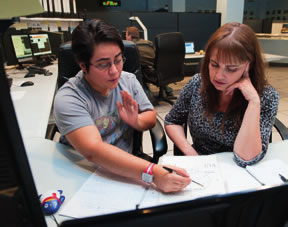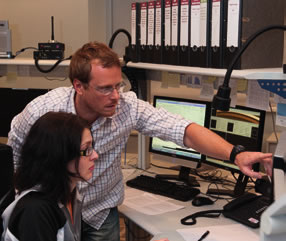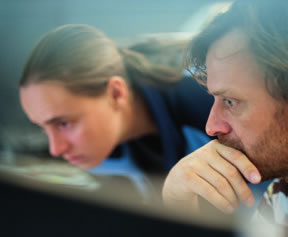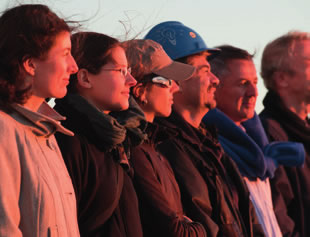Share
Working at ESO
Are you interested in working in areas of frontline technology and in a stimulating international environment? Do you feel your profile matches our requirements? Learn more about our current vacancies and apply online. Read more..








The European Southern Observatory (ESO) is the foremost intergovernmental astronomy organisation in Europe and the world's most productive astronomical observatory. ESO operates world-class observatories in the Atacama Desert region of Chile: the La Silla Observatory, the Very Large Telescope (VLT) at Paranal, and the Atacama Large Millimeter/submillimeter Array (ALMA) and the Atacama Pathfinder Experiment (APEX) at Chajnator. ESO is building the European Extremely Large optical/near-infrared Telescope, the E-ELT, which will become "the world's biggest eye on the sky".
The ESO Headquarters, the scientific, technical and administrative centre of the organisation, is located in Garching, near Munich, Germany. ESO also operates an office in Santiago to support its operations in Chile.
For its Directorate of Engineering ESO is looking for a
Software Engineer - Science Operations Software
Garching
Deadline 03/10/2016
About the role
We are looking for a software engineer to join our Data Flow Infrastructure group in the Science Operations Software department of the Directorate of Engineering. The Data Flow Infrastructure Group is responsible for the development and maintenance of software components that are critical for the end-to-end operation of the La Silla Paranal and ALMA observatories. The Data Flow Infrastructure Group delivers operational tools and services to science operation groups, principal investigators and the ESO astronomical community at large, and supports the development of new products for the VLT, ALMA and E-ELT ESO programmes.
Your first assignment will be the development and maintenance of a suite of software tools that support the full life cycle of science operations at the ALMA observatory in Chile and the ALMA Regional Centres in Europe, North America and East Asia. These include tools for ingesting data into the ALMA operational, science and engineering archives and for extracting, transforming and searching it, and efficiently delivering that data to scientists around the globe. The tools are a mixture of command-line and web-based interfaces as well as libraries to support other subsystems. You will frequently interact with the Subsystem Scientists, located at the ALMA observatory in Chile or the ALMA Regional Centres in Europe, North America and Japan, for the specification and the validation of the tools. In collaboration with the observatory staff and your colleagues in the ALMA Computing Team and the Dataflow Infrastructure group, you will be able to operate independently, meet the agreed deadlines and proactively contribute to on-going process improvements.
Duties & responsibilities:
- Interact with the Subsystem Scientists for the specification and validation of the assigned software tools. This task involves the translation of scientific requirements to software requirements and learning to understand and speak the scientists' "language".
- Maintain and further develop the existing operational tools, with an emphasis on supporting the ALMA science archive.
- Collaborate with our partners at the ALMA Observatory in Chile and the ALMA Regional Centres to integrate and deploy the software tools, and monitor how they perform; short (approx. 2 week) missions to Chile or elsewhere are foreseen once or twice a year.
- Participate in the general development activities in the ALMA Computing and Dataflow Infrastructure groups
Skills & Experience:
- A minimum of three years professional experience developing software in Java.
- Experience in other high-level object-oriented programming languages, in particular C++ or Python will be an asset.
- Experience in interfacing Java to relational databases using JDBC and high-level frameworks such as Spring and Hibernate
- Proven experience with Java Web-based applications (servlets, JSPs) and JavaScript single-page applications (Angular JS, jQuery)
- Solid practical familiarity with modern software engineering practices and tools, including configuration control tools, incremental & iterative development, unit and integration testing and the Linux environment.
- Background in astronomy or astrophysics, especially radio interferometry will be an asset.
- Experience in working in an international environment will be an asset.
Key Competences:
- Demonstrated capability of conducting small to medium size software projects throughout the entire software lifecycle up to successful deployment.
- Capability to adjust quickly to changing circumstances and being prepared to work on an already very advanced development.
- Very good oral and written communication skills.
- Right balance between maintaining the big picture and a hands-on attitude to get things done.
- Willingness to actively contribute to continuous process improvements.
Qualifications:
University degree in Computer Science, Astronomy, Physics, Engineering, or equivalent.
Language Skills:
A very good command of the English language - oral, reading and writing - is essential.
Reports to:
The Dataflow Infrastructure Group Head
Remuneration and Contract:
We offer an attractive remuneration package including a competitive salary (income-tax free), comprehensive pension scheme and medical, educational and other social benefits, as well as financial help in relocating your family and the possibility to place your child/children in day-care.
The initial contract is for a period of three years with the possibility of a fixed-term or indefinite extension based on performance and achievements. The title or grade may be subject to change according to qualification and the number of years of experience.
Starting Date:
As soon as possible
Duty Station:
ESO Headquarters in Garching, near Munich, Germany. This position involves duty travel to the ESO sites in Chile and/or partner institutes in Europe, North America and Japan.
Career Path:
V
Application:
If you are interested in working in areas of frontline technology and in a stimulating international environment, please visit <http://www.eso.org> for further details.
Applicants are invited to apply online at <http://jobs.eso.org/>. Applications must be completed in English and should include a motivation letter and CV.
Closing date for applications is 3 October 2016 (CET).
No nationality is in principle excluded. However, recruitment preference will be given to nationals of Austria, Belgium, Brazil, the Czech Republic, Denmark, Finland, France, Germany, Italy, the Netherlands, Poland, Portugal, Spain, Sweden, Switzerland and United Kingdom.
The post is equally open to suitably qualified female and male applicants.
